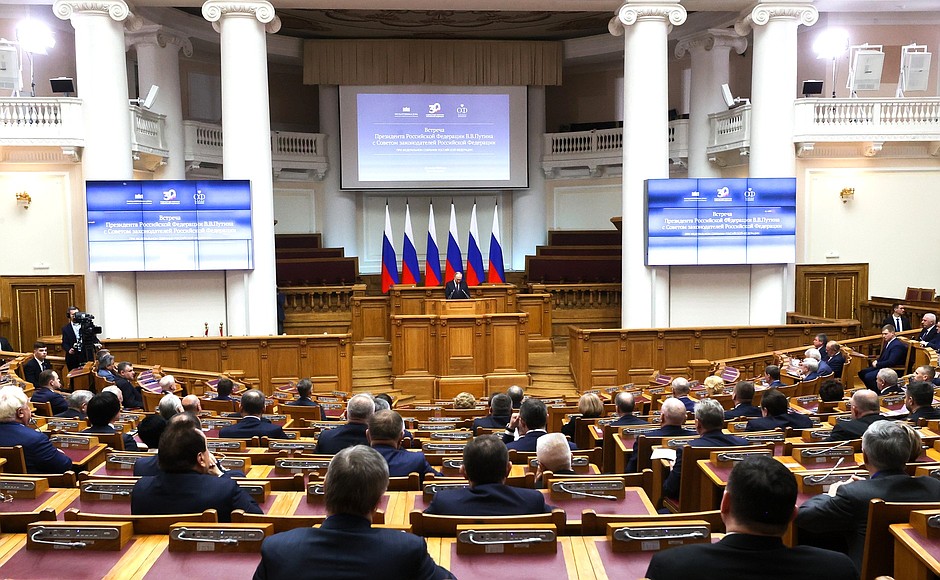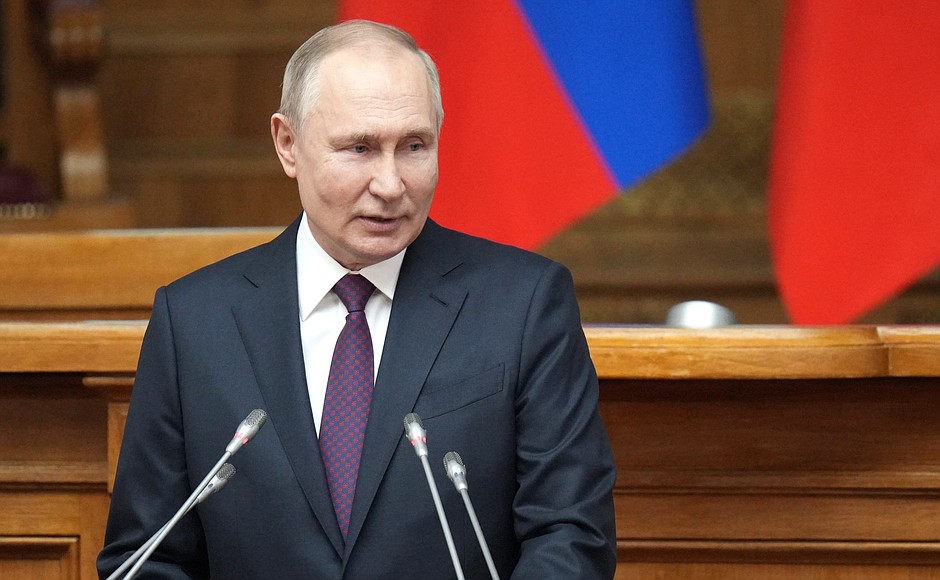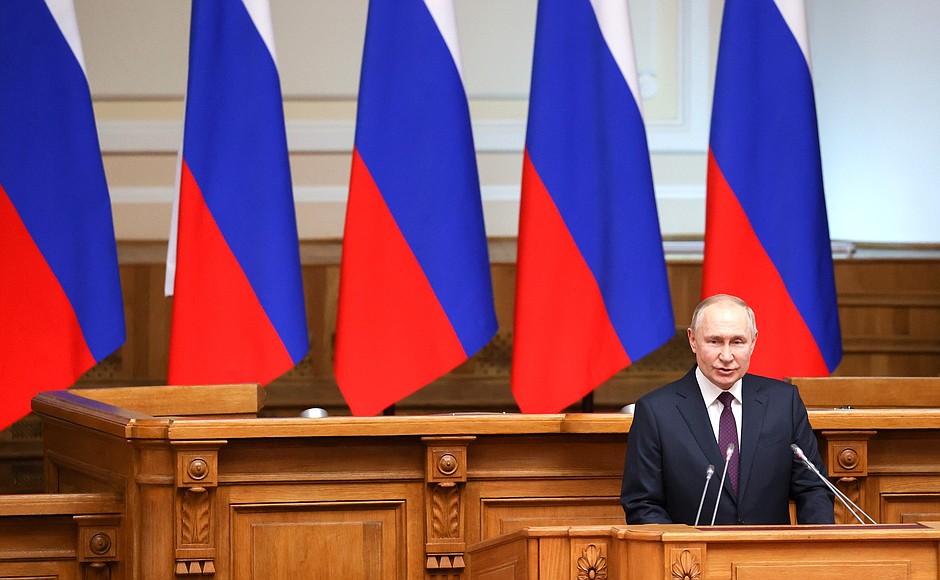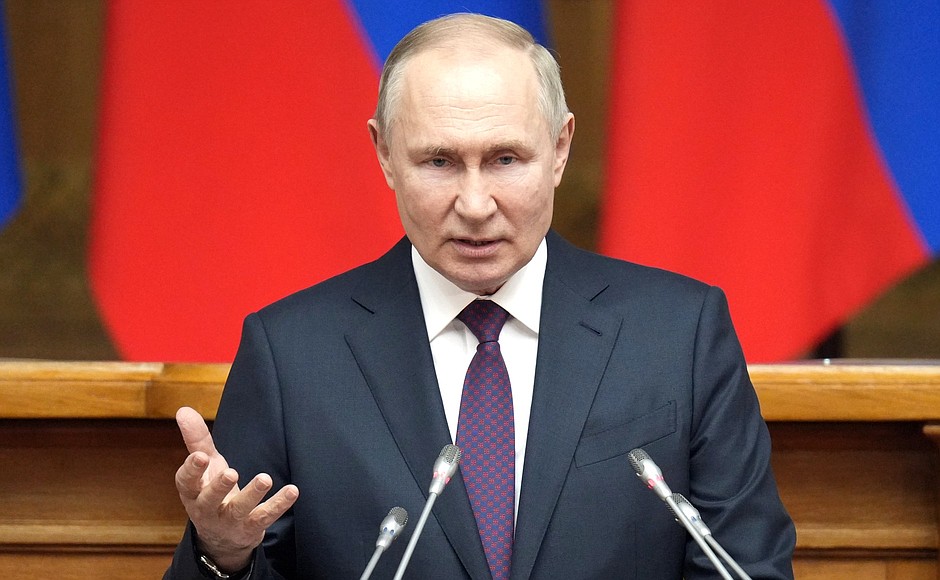President of Russia Vladimir Putin: Good afternoon, colleagues,
Traditionally, the meeting of the Council of Legislators has been timed to coincide with Day of Russian Parliamentarism that was marked yesterday, April 27.
I would like to congratulate you on this holiday and thank the senators and deputies, all your colleagues in the Russian regions for your hard, substantive and productive efforts to create a solid legislative foundation for promoting the effective socioeconomic development of our country, for improving living standards and for enhancing the sovereignty and security of our state.
Many of our parliamentary traditions were established at the beginning of the last century, during pre-revolutionary convocations of the State Duma, that worked in the Tauride Palace since 1906.
First Duma Speaker Sergei Muromtsev highly appreciated the potential of institutions of broad popular representation. He believed that their main mission was to promote people’s belief “in statehood as a bulwark of their rights and a source of non-hypocritical concern for people’s wellbeing.” He said the state as a whole should be “a matter of public work.”
Indeed, many of your predecessors, the first Russian MPs, upheld the interests of the people enthusiastically and sincerely. They cared about national welfare, strove to be useful to their country and considered it their ultimate duty to live and work for the Fatherland.
These patriotic ideals are important in all times, all the more so for us and Russia – a country-civilisation, one of the distinguished, sovereign centres of this vast multipolar world.
The values of devoted service to the people and one’s own Motherland determine the power and sustainability of state government and confirm the unity and cohesion of our people. They are a key, immutable guarantee that together we will overcome any trial and will consistently move only forward to our lofty, great goals.
Colleagues,
This year, modern Russian parliament – both chambers of the Federal Assembly – turns 30. It was formed on the same day the current Constitution was adopted, December 12, 1993.
Extensive and invaluable experience in state building has been accumulated over the past three decades, and the foundations of Russia’s legislation as a democratic, legal, federal and social state have been formed.
Our multi-party system has formed and become stronger in an open, competitive and occasionally very tough struggle. Leading political forces have proven their robustness and maturity.
At the same time, parliamentary status and the right to represent millions of Russian citizens must, of course, be reaffirmed constantly, every day, by hard and honest work. People's trust, their opinions and proposals and requests in the broadest sense of the word are what matters most in this regard.
Importantly, the most burning and acute issues our citizens may face, problems they encounter, priority needs and goals of developing the national economy and strengthening the country's security remain unconditional priorities both during the elections and in your everyday work. That is how it is today, and this is how it should always be.
Supporting the special military operation and the defence industry, ensuring social and legal protection of our heroes – military personnel, the volunteers and soldiers who were called up under the mobilisation – have been the most important and central items on the parliamentary agenda of this and the past year.
Legislative resolutions have been adopted promptly with the strong involvement and the support of all Duma parliamentary parties, the Federation Council and regional parliaments. I want to thank you for that separately. Thank you for this consolidated and joint effort.
However, not everything has been done yet. A new package of measures to support those taking part in the special military operation and their families has been proposed by the parliamentary working group and now needs to be worked through.
The legal support for the full integration of the four regions that became part of Russia on September 30, 2022, the Donetsk and Lugansk people's republics, the Zaporozhye and Kherson regions, is another priority.
It is important to do this work carefully and systemically so that people feel part of our country’s common economic, educational and cultural space. They should have the entire system of labour and social guarantees, including high-quality medical care, work for them in full. They should see new jobs created and conditions for dynamic economic growth and speedy rebuilding of infrastructure and life support facilities put in place.
These are our historical lands and people who are one of us. Many of you have been there. How are they different from the rest of our people? They are not. They are part of our people. And we must do everything to uphold and protect their unwavering choice to return to Russia.
Colleagues,
Today, in light of the West’s economic aggression, the Parliament, the Government and all regional and local authorities need to act efficiently and promptly, work as a cohesive and well-coordinated team.
I have already said in my Address that our goal is not to adapt, not to wait out the period of difficulties, challenges and external pressure, but to build a foundation for our country’s long-term, independent and successful development, for strengthening its sovereignty in all areas – politics, the economy, science, technology, education and culture – relying primarily on domestic resources, natural advantages and the creative potential of our multi-ethnic country’s people.
In this connection, the pursuit of law-making should be aimed at full support for domestic enterprises, research centres and workforce, new breakthrough projects in all industries and sectors, the general expansion of the freedom of entrepreneurship and the removal of barriers to business activity. As you can see, we are making progress with this so far, thank God. It is sufficient to look at the results of work over the past year and look at all the macroeconomic indicators. Thank God, people’s real incomes have begun to grow, modestly so far, but still. Look at the forecasts of the same international organisations on the growth of the Russian economy. Everything is more or less stable there. Even those who are reluctant to show these prospects have to show them.
And look at those who are creating problems for us. They seem to be creating problems for themselves.
We need to diligently finetune the entire range of mechanisms and instruments we have created to attract investment, and to ensure balanced territorial development and financial stability for all regions of the country from Sakhalin to Kaliningrad and from the Russian Arctic to Crimea and Novorossiya.
And of course, the Parliament’s primary concern should always be improving people’s quality of life and increasing their incomes, providing tangible targeted support for our citizens, families with children and people who find themselves facing hardship. In general, greater prosperity for the people is our joint top-priority task.
New initiatives to develop the social sphere and the economy, and the sovereign education system… I deliberately used the expression “sovereign education system.” This is a major element of our joint work. It determines the future of our country. I cannot help but agree with many of the leaders of parliamentary parties that I met recently. Practically all of them are talking about this. I fully agree with them. I said this in the Address on February 21. I am seeing intensive efforts to implement this Address. I would like to ask you not to slow the pace and quality of drafting the laws required for this purpose.
I would like to mention one more aspect separately. I believe parliamentary diplomacy is gaining additional and enormous importance. Our partners, or I can already call them our former partners in some countries, are compulsively destroying legal frameworks and dialogue channels. They are trying to impose their own views and so-called rules on everyone. What are these rules about? I have said this many times. Nobody has seen them. Who compiled these rules? They are writing them somewhere under a blanket and then are doing something with them under the blanket. But we won’t crawl under their blanket and we are not going to follow their rules.
However, despite these efforts, the intensity of international contacts, including those that involve our parliament, is not declining. It is even growing and this is a good, correct and indicative trend.
I will repeat – Russia is not going to isolate itself. On the contrary, we will expand pragmatic, equitable, mutually beneficial and exclusively partner relations with friendly countries in Eurasia, Africa and Latin America. Incidentally, many people in the United States think like us. It’s the same in Europe. Their elite behave differently, but we know that many of the elite in these countries pursue a policy in spite of the interests of their own people. They will get it back one day.
We are willing to work with those foreign partners, with those global companies and corporations that value their business reputation and want to cooperate with Russia.
I hope your many meetings with your foreign colleagues will continue promoting interstate ties and mutual trust.
In general, colleagues, I would like to wish you success in your complicated, multifaceted, diverse and very important work.
I would like to once again congratulate you on Day of Russian Parliamentarism and on the upcoming May holidays, but first of all, on our sacred Day of the Great Victory, victory over Nazism.
All the best to you!
Thank you very much.



